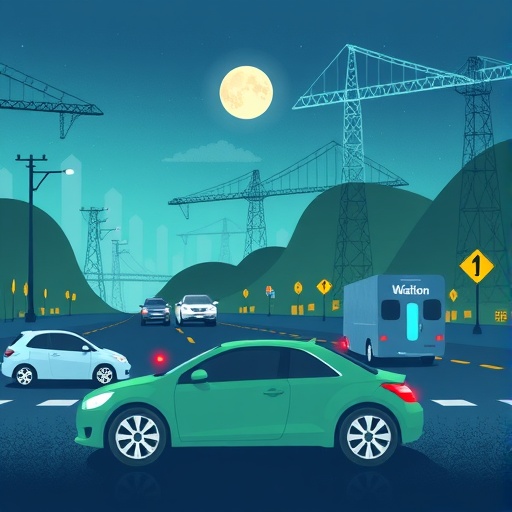In the urban landscapes of Tel Aviv and Jerusalem, where car ownership is traditionally equated with freedom and convenience, a striking new phenomenon is emerging. A recent observational study led by Professors Galit Cohen-Blankshtain and Anat Gofen from the Hebrew University of Jerusalem reveals an unexpected yet insightful trend among middle-class families opting to live without cars by choice rather than necessity. This voluntary carlessness challenges prevailing assumptions about transportation norms and opens up influential discussions on urban mobility, lifestyle, and policy design.
The research focused on 27 families inhabiting two of Israel’s largest cities, selected for their deliberate choice to forego private vehicle ownership despite having the financial means to maintain one. Contrary to common expectations grounded in economic or environmental constraints, these families cited multifaceted motivations rooted deeply in personal values and social principles. Notably, concerns ranged from a genuine fear of driving and managing car ownership responsibilities to aspirations for healthier living conditions and fostering child independence within close-knit communities.
One of the most compelling revelations from the study highlights how these families strategically navigate the urban environment to maintain mobility and meet daily demands without the automobile’s convenience. Many reside in highly walkable neighborhoods characterized by dense infrastructure, accessible public transit, and safe pedestrian pathways. This carefully selected geography reduces their reliance on cars and encourages more active forms of movement such as walking, cycling, and using shared transportation services, thereby enhancing urban livability and environmental sustainability.
Moreover, these families have developed adaptive routines to circumvent the spontaneous travel typically facilitated by car ownership. Their instrumental strategies include the prudent use of taxis, car rentals, and ride-sharing platforms as needed, along with meticulous planning for appointments, errands, and social activities. This disciplined approach underpins their ability to balance convenience, flexibility, and a reduced carbon footprint without compromising family obligations or lifestyle desires.
Emotional dimensions play a pivotal role in understanding voluntary carlessness, especially the complex feelings surrounding driving anxiety and the perceived burdens of vehicle maintenance. The fear of accidents, traffic congestion, and the ever-increasing responsibilities tied to car ownership seem to outweigh the societal pressure to own a vehicle. This emotional calculus reframes carlessness not just as an avoidance strategy but as a conscious lifestyle choice aligned with mental well-being and quality of life.
By highlighting these “outlier” families, the study not only furthers academic transport discourse but also disrupts normative assumptions about mobility behaviors. The researchers argue that focusing on these contrasting cases can bring fresh perspectives to policy-making that typically fixates on majority behaviors and mainstream economic models. This reframing is paramount in addressing modern urban challenges like congestion, pollution, and social fragmentation, which are often exacerbated by ingrained car dependency.
From the policy standpoint, the findings underscore an urgent need to broaden support mechanisms for car-free living. Enhancements in mobility infrastructure, such as expanding efficient and reliable public transit, integrating flexible mobility-as-a-service models, and improving digital tools for trip planning, are crucial. Equally important is shifting public narratives to elevate the social and health benefits of active transportation and communal living, thereby reducing the stigma or perceived inconvenience around choosing a carless lifestyle.
The study also contributes significantly to the interdisciplinary conversation on urban planning and sustainability. It calls for a reexamination of how dense city environments can be optimized not merely for vehicular throughput but as vibrant, human-centered spaces. Walkability, mixed land use, and proximities to essential services emerge as critical design principles that support both voluntary carlessness and broader environmental goals.
In applied terms, the research aligns with emerging concepts in behavioral economics and human geography, where individual choices intersect with structural factors to produce novel social dynamics. These carless families embody a form of agency that contests the deterministic narratives of consumerism and automobile reliance, advocating instead for purposeful, value-driven decision-making within urban life.
Technologically, the study hints at the growing role of digital ecosystems in enabling car-free living. Mobile applications for shared rides, real-time transit updates, and automated scheduling assist these families in coordinating complex mobility needs efficiently. This symbiotic relationship between technology and lifestyle choice exemplifies the transformative potential of smart city initiatives when thoughtfully implemented.
As Israel continues to grapple with rapid urbanization and its consequences, insights from these families present a timely challenge and opportunity. They point toward a future where mobility is decoupled from car ownership, replaced instead by sustainable modes that enhance well-being, social cohesion, and environmental stewardship. Such transformation requires multisectoral collaboration across urban planners, policymakers, transport engineers, and communities to translate these individual adaptations into systemic change.
Ultimately, the Hebrew University study advances a nuanced understanding of voluntary carlessness as a multifaceted phenomenon shaped by emotional, social, practical, and environmental considerations. It suggests that outliers who deviate from conventional mobility paths can illuminate pathways toward more equitable and resilient urban futures. Their experiences are a call to rethink not only transport infrastructure but also cultural attitudes about freedom, autonomy, and connectedness in modern cities.
This research adds a significant voice to the global dialogue on sustainable urban mobility, demonstrating that reducing private vehicle dependence is as much about human motivation and social fabric as it is about policy and technology. It invites stakeholders to embrace innovative frameworks that support diverse ways of navigating and inhabiting cities, fulfilling both individual aspirations and collective resilience.
Subject of Research: People
Article Title: Understanding voluntary carlessness: Why outliers matter
News Publication Date: 28-Feb-2025
Web References: 10.1016/j.jtrangeo.2024.104095
Keywords: Transportation, Vehicles, Behavioral economics, Society, Urban planning




